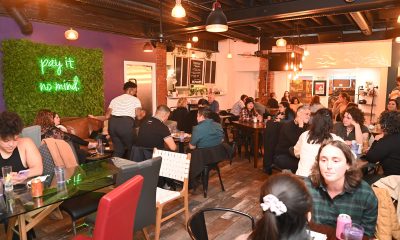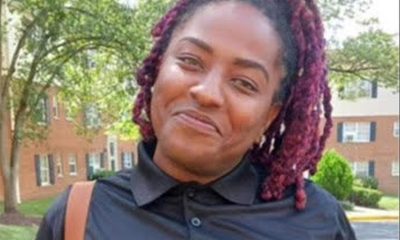District of Columbia
D.C. man sentenced to 7 months for attack against gay Asian man
Sentencing follows accepted plea offer
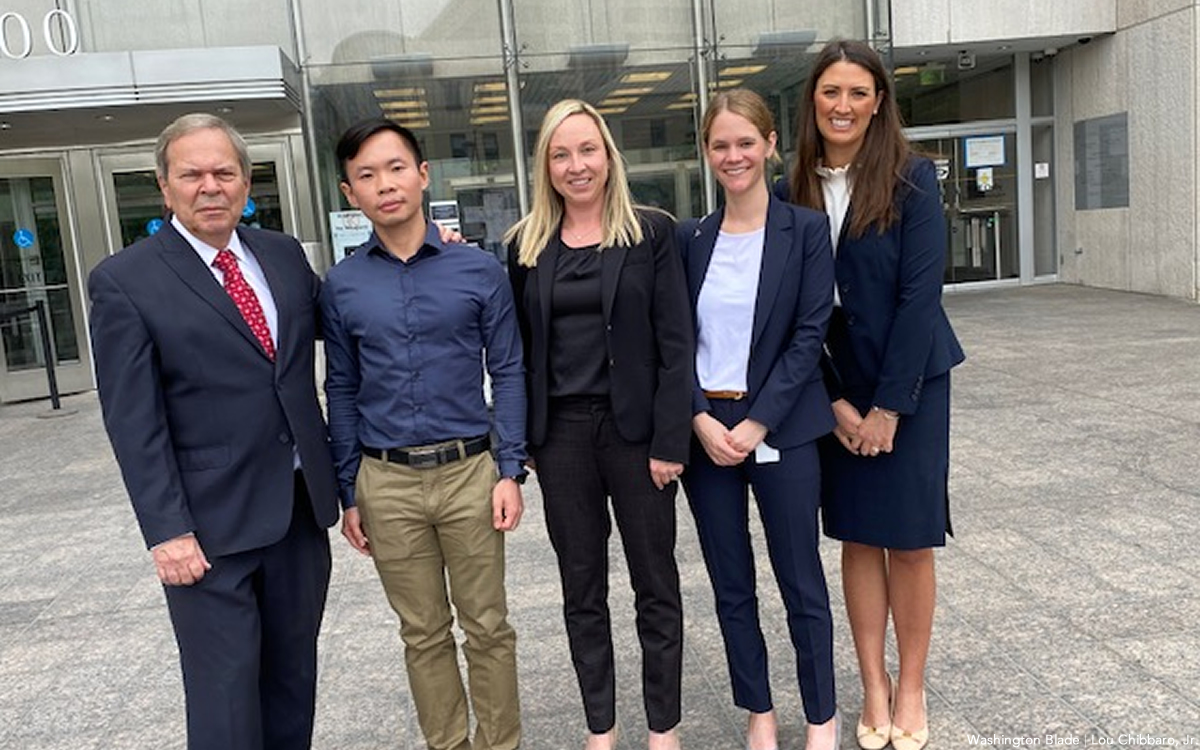
A D.C. Superior Court judge on Thursday sentenced District resident Patrick Trebat, 39, to seven months in jail following a dramatic court hearing in which a gay Asian man, Sean Lai, described how Trebat assaulted him and his parents while shouting homophobic and anti-Asian slurs in an unprovoked attack last August on a D.C. street.
The sentencing came after Trebat pleaded guilty during the same hearing to three counts of misdemeanor simple assault, with one of the counts designated as a hate crime based on the victim’s ethnicity. The guilty plea was part of a plea bargain offer by prosecutors with the Office of the U.S. Attorney for D.C.
In exchange for Trebat accepting the plea deal, prosecutors agreed to drop two earlier felony charges of bias-related assault with significant bodily injury brought against Trebat in connection with the attack on Lai and his parents.
Judge Michael O’Keefe officially sentenced Trebat to 21 months of incarceration for the three charges, but suspended all but seven months of the sentence. O’Keefe also sentenced Trebat to three years of supervised probation upon his release, with the stipulation that he will be required to serve the full 21 months if he violates the terms of his probation.
Trebat, who had been released on a partial home detention order shortly after his arrest just under 10 months ago, was placed in immediate custody and escorted out of the courtroom by U.S. marshals after the conclusion of the sentencing part of the hearing to begin serving his sentence.
In delivering a victim’s impact statement in the courtroom, Lai told O’Keefe that in addition to inflicting physical injuries on him and his parents that required emergency treatment at a hospital, Trebat’s attack on his family caused deep emotional scars that continues to haunt all three of them.
He said he objects to the plea bargain deal on grounds, among other things, that it does not designate Trebat’s violent attack as a hate crime based on Lai’s sexual orientation, only on his and his parents’ ethnicity.
Court records show that Trebat attacked Lai and his elderly parents, who are of Chinese ancestry, as they were walking on a street in the city’s Observatory Circle neighborhood near where they were living and within sight of the Washington National Cathedral.
Police charging documents filed in court state that Trebat called the three victims “faggots” and shouted, “You are not Americans” as he approached them while they were walking along the 3700 block of Fulton Street, N.W. at about 9:30 p.m. on Aug. 7, 2021. One of the documents says Trebat punched and shoved the three victims, knocking each of them to the ground, after initially punching Lai’s father in the head from behind while shouting, “Get out of my country.”
“As painful as it is to relive this moment when this atrocious attack took place, I choose to be here today because I wanted you to hear my own voice and perspective, as well as the perspective from my parents,” Lai told the judge. “The defendant attacked me and my elderly parents without provocation, motivated simply by his hatred toward our race and my sexual orientation,” Lai continued.
“But what breaks my heart the most is what was done to my parents,” he said. “I had to take them each to several orthopedics appointments over the following months. I secretly cried in my bed each night after seeing the pain that was inflicted on them and the psychological trauma that they experienced.”
Gay D.C. Advisory Neighborhood Commissioner Mike Silverstein followed Lai by delivering an LGBTQ community impact statement before the court on behalf of the city’s ANC LGBTQ Rainbow Caucus, the D.C. Center for the LGBT Community, and what Silverstein said was Lai’s request that he speak on behalf of the Asian and Pacific Islander community.
“Thank you, Your Honor, for the opportunity to give this victim’s impact statement,” Silverstein said. “And please forgive me for the next 13 words, which were not mine,” he said.
“’Fuck you bitch!’ ‘Faggot!’ ‘You are not Americans! Get out of this country!’”
“Those were the 13 words Patrick Trebat shouted at Sean Lai and his elderly mother and father just before Mr. Trebat physically attacked them without provocation,” said Silverstein as courtroom spectators listened intently.
“As members of the LGBT+ community, we feel this was an attack on every one of us,” Silverstein continued. “It was a direct attack on our right to exist and to live openly in the District of Columbia. We respectfully ask the court to issue the maximum jail sentence so that our community can feel that we are protected, and that we need not live in fear that those who would do us harm will get off easy,” he said.
After asking Trebat to confirm that he fully understands and agrees to the terms of the plea offer, O’Keefe invited Trebat to give his own statement just prior to the sentencing.
Trebat, who was dressed in a suit and tie, offered his “deepest apologies” to Lai and Lai’s parents, who were not present in the courtroom. Trebat said he was intoxicated on alcohol and drugs at the time of the incident and had no recollection of what happened.
“I was legitimately out of my mind that night,” the told the judge. He said alcohol and prescription drugs caused him to engage in “stupid” acts. “I am sorry for the shame I brought to my parents, to American University, and to the victims,” he added.
He was referring to his status as a graduate student at American University at the time of his arrest. The university later expelled him from his enrollment there after American University students protested that he had initially been allowed to continue his studies following a hate crime arrest.
“This event was not personal. I ’m not a racist,” he said. “I take full accountability for what happened. I’m a changed person.”
Trebat’s attorney, Brandi Harden, asked O’Keefe to sentence Trebat to only a suspended jail term and a stringent term of probation rather than incarceration, saying that he suffers from and has long been treated for mental health issues, which would be worsened if he were to be sent to jail.
Assistant U.S. Attorney Robert Platt, the lead prosecutor in the case, expressed opposition to Harden’s request, telling the judge that Trebat was already receiving a “significant benefit” from the plea offer.
“We don’t dispute that the defendant was intoxicated,” Platt said. But he added that the plea deal includes a provision for mental health and substance abuse treatment and that Trebat needs to be held responsible for his actions.
“This was part of hate crimes against Asians across the country,” Platt told O’Keefe before providing statistics of the violent hate crime attacks against Asian Americans nationwide. “This type of attack will not be tolerated,” he said.
Although Platt acknowledged that Trebat also hurled homophobic slurs at Lai and his parents during the attack, he did not explain why prosecutors chose not to include a hate crime designation pertaining to sexual orientation in the plea bargain offer.
“I believe he is remorseful,” O’Keefe said in handing down his sentence. “But there has to be some punishment,” he said. “You have been shamed, and that is part of the penalty,” O’Keefe added. “It was your own actions that brought this on … I think this sentence strikes a good balance.”
In response to a request by the Washington Blade for comment on why prosecutors decided to reduce the severity of the charges against Trebat through the plea agreement and did not include sexual orientation in the hate crime designation, U.S. Attorney spokesperson William Miller sent a brief statement to the Blade.
“The U.S. Attorney’s Office thoroughly investigated and analyzed the facts and circumstances of this case and provided what we determined to be an appropriate plea offer,” the statement says. “We extend a plea offer in almost every case charged in Superior Court,” it says.
“The plea offer extended in this case included a bias enhancement,” the statement continues. “Our office is committed to fully prosecuting bias-related crimes and held this defendant accountable for his appalling conduct.”
The texts of the victim’s impact statement delivered in court by Lai and the community impact statement given by Silverstein can be viewed below:
U.S. v. Trebat
Victim Impact Statement
By: Sean Xiangwen Lai
Your Honor,
Thank you for the opportunity to give my victim impact statement. I have gathered the courage to stand before you today at this hearing, to tell the court and my community about the defendant’s assault on me and my elderly parents, and the suffering we have endured as a result of his horrific actions. As painful as it is to relive the moment when this atrocious attack took place, I choose to be here today because I wanted you to hear my own voice and perspective, as well as the perspective from my parents.
The defendant attacked me and my elderly parents without provocation, motivated simply by his hatred toward our race and my sexual orientation. We were walking on the streets of our neighborhood, enjoying our time outdoors during this unprecedented time when being outside of our home was a small joy of which we could take advantage. We were defenseless, feeling what we thought was secure so close to our home, when he assaulted us, beating up my parents and me. I am here today to tell the court in person that a man who would do this to an innocent family deserves the maximum prison sentence and does not deserve the leniency he has already received from the plea bargain offered by the prosecutors, which my family and I have expressed is very disappointing.
Last August, my parents and I were taking a walk in our neighborhood, very near our home. It was a beautiful Saturday night, but little did we know that our lives would be changed forever that night. “Fuck you bitch! Faggot! You are not Americans! Get out of this country!” were the words the defendant yelled at us before he punched my dad in his head with a closed fist from behind causing him to fall to the ground. When my mom and I hurried over to help my dad, the defendant attacked us as well. As a result of the fall my dad took when the defendant attacked him, my dad suffered a fracture to the bone of his left wrist and both of his knees were injured; my right pinky finger was fractured; and my mom’s right shoulder muscle was torn. All of us had bruises and cuts on all over our bodies. He appeared to get scared as I started yelling loudly for help on our quiet neighborhood street. He stopped attacking us and attempted to leave. As he was trying to flee the scene, I yelled at him: “This is a hate crime. You are not getting away with this.” He stopped, turned around and smirked at me saying “Oh, I will!”
This frightening image of his maliciousness and remorselessness has played repeatedly in my worst nightmares ever since. And he remained unrepentant, even after he was arrested. With blood dripping from my mouth, I tried to explain what happened to the responding police officer at the scene. Handcuffed and detained, this man was still yelling at me saying “Shut the fuck up. Drama queen!” right in front of the police officer.
Not a day goes by that what my parents and I suffered does not interfere with our lives. I had to take several weeks away from work and lost countless nights of sleep. I spoke to a therapist for several months and I am still working through the trauma inflicted on me. Even now I can feel the pain in my right pinky finger, which serves an enduring reminder I cannot ignore. I continue to live in fear for being who I am: An openly gay Asian man.
But, what breaks my heart the most is what was done to my parents. I had to take them each to several orthopedics appointments over the following months. I secretly cried in my bed each night after seeing the pain that was inflicted on them and the psychological trauma that they experienced. For a long time, my mom was afraid to even walk on the street in the middle of the day, still afraid an attack could happen at any time. My dad still has pain in his wrist and both his knees.
I strongly believe that the attacker thought that he could easily get away with what he did, avoiding any severe punishment, based on his unrepentant words and behaviors following the attack and his arrest. And the plea deal proves that it was just a slap on the wrist for the hate crime he committed against me and my elderly parents. We have repeatedly expressed the frustration on the plea deal to the prosecutors. Three counts of simple assault with only one hate crime enhancement on national origin are simply unacceptable.
Therefore, I respectfully request that the court serve justice and issue the maximum jail sentence, which I believe is the right thing to do and will show the community that unprovoked violence against defenseless members of the community will not be tolerated, and that no one in the District of Columbia should live in fear of being targeted simply because of who they are.
Thank you.
U.S. v. Trebat
Community Impact Statement
By: Mike Silverstein, ANC Commissioner
I am offering this on behalf of 16 other openly LGBT+ elected D.C. Advisory Neighborhood Commissioners, and on behalf of the DC Center for LGBT. Sean Lai has asked me to speak for our community, and the AAPI community. As someone who was Bar Mitzvah at Tree of Life Synagogue in Pittsburgh, this takes on a special urgency to me.
Thank you, Your Honor, for the opportunity to give this victim impact statement. And please forgive me for the next 13 words, for they were not mine….
“Fuck you bitch!”
“Faggot!”
“You are not Americans! Get out of this country!”
Those were the 13 words Patrick Trebat shouted at Sean Lai and his elderly mother and father just before Mr. Trebat physically attacked them without provocation.
As they were out for a walk, the Lai family was beaten for no reason other than their race and Sean’s sexual orientation.
As members of the LGBT+ community, we feel this was an attack on every one of us. It was a direct attack on our right to exist and to live openly in the District of Columbia.
We respectfully ask the court to issue the maximum jail sentence so that our community can feel that we are protected, and that we need not live in fear that those who would do us harm will get off easy. The maximum sentence will deter others from committing this brutal crime on our community and it will show the community that it is never open season on Asian Americans or LGBT+ people or anyone.
What happened to Sean and his parents reminds our community that violence against us — for being ourselves — can happen anywhere at any time: San Francisco City Hall, the Pulse nightclub in Orlando, the Atlanta shooting targeting Asians, an arson fire at a queer nightclub in New York City a month ago and all those unprovoked attacks on streets and subways against Asian Americans in the past two years.
Violent hate crimes are a plague upon our nation. What’s next? The defendants’ assault on Sean and his family is part of this ongoing horror.
Despite the progress we have made as a community, the LGBT+ community is still at risk, especially minorities. Murders of trans people have reached epic proportions. And here, this unspeakable attack on an Asian American and his family began with homophobic slurs.
Sean Lai is openly and proudly gay. He is proud of his Asian heritage.
He was attacked because of who he is — and that is who we are: Members of a minority, supposedly protected by law against discrimination and violence.
This brutal attack has deeply impacted and harmed us in many ways:
What happened to Sean brought back bad memories to nearly all of us, and fear and nightmares to some of us. So many of us spent years hiding who we are for fear of rejection and out of fear for our safety. Those of us who were in the closet kept silent as members of our community were bullied or attacked.
Those who have been bullied or attacked will always remember what happened to us. It becomes a part of us. Some in our community — especially our trans siblings — often do not walk alone in parts of D.C. or at certain times of the day because they don’t feel safe unless they are with someone else. Each of us must deal with the emotional harm individually — and attacks like this one — out of the blue, on a pleasant summer evening — in the shadow of the National Cathedral — triggers us in so many ways.
We are sickened and angered by the incidents of physical violence against our community and we are tired of being overlooked or silenced. We are especially angered by the process of the criminal justice system.
To begin, this was an irrational, unprovoked attack on Sean and his family – and the community is extremely disappointed that the defendant was not detained pending the outcome of this case.
Sean and the LGBT+ community have waited months for closure in this criminal case, only to be here today to listen to a plea deal on misdemeanor charges. A victim of another hate crime in DC several years ago may have put it best, when she said, “when you bargain away the hate crime enhancement, you bargain away part of my soul.”
I also want to address the fact that, with respect to the crimes against Sean, the defendant was never charged with a hate crime enhancement with respect to sexual orientation; and, the crime that the defendant pled guilty to did not include any hate crime enhancement at all – just simple assault. Sean has repeatedly expressed to the prosecutors how important it is that the hate crime enhancements be included for both national origin and sexual orientation. Our community is disappointed that the defendant was not charged with a hate crime based on sexual orientation because a gay person was called “bitch” and “faggot,” physically assaulted, injured. If that’s not a hate crime based on sexual orientation, what is?
A sentence without significant jail time will leave members of the LGBT+ and Asian American community even more victimized, vulnerable and distrustful of the criminal justice system.
We are here today to implore the court to impose a sentence that will send a clear message that violence against people for who they are will not be tolerated.
We must stop Asian hate. We must stop violence against the LGBT+ community. We must stop violence against all people who are attacked because of race, religion, national origin, sexual orientation or whatever. This epidemic of hatred and madness and violence is tearing our nation and our community apart. We must not live in fear, one of another.
We request a long jail sentence that shows that this court affirms the right of every person in the District of Columbia to live honestly, openly, and without fear.
We ask that the court provide justice for Sean and his family, the Asian-Pacific community, and the LGBT+ community. Thank you.
District of Columbia
Reenactment of first gay rights picket at White House set for April 17
Event marks 59th anniversary of historic push for gay rights in nation’s capital
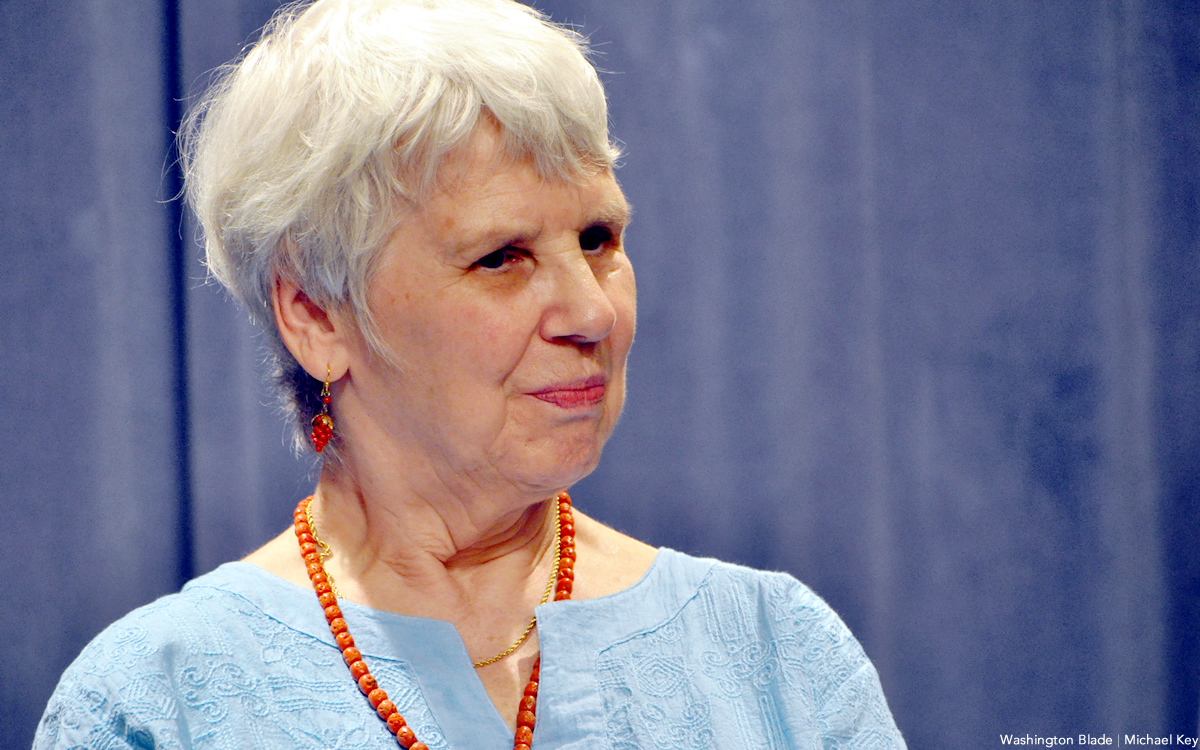
D.C.’s Rainbow History Project announced it will hold a reenactment on Wednesday, April 17, of the historic first protest for gay rights in the form of a picket line in front of the White House that took place on that same day in 1965.
In a statement released last week, Rainbow History Project says the reenactment will mark the 59th anniversary of an event that is credited with bringing attention for the first time to the federal government’s longstanding discrimination against a minority group referred to then as homosexuals or gays and lesbians.
The statement notes that the 1965 event was organized by the Mattachine Society of Washington, D.C., the first politically active LGBT organization in the nation’s capital founded by local gay rights pioneer Frank Kameny.
“The picket took place on the White House sidewalk, Lafayette Park, 1600 Pennsylvania Ave., on April 17, 1965,” the statement says. “For exactly one hour, from 4:20 p.m. to 5:20 p.m., members of the Mattachine Society of Washington walked in a circle, non-stop, in silence, carrying posters of their demands,” the statement continues.
“The White House picket is the origin story for public demonstrations for gay rights in the U.S., and the origin story for Pride Marches and the annual LGBTQ Pride celebrations which occur across the globe,” according to the statement.
It says those picketing in the April 1965 event, which included Kameny and longtime local D.C.-area lesbian activist Lilli Vincenz, both of whom held doctorate degrees, called on the government to adopt the Mattachine Society of Washington’s four major demands: an end to the exclusion of homosexuals from federal government employment; an end to the ban on gays and lesbians from serving in the U.S. military; an end to the “blanket denial” of security clearances for gay people; and an end to the “government refusal to meet with the LGBTQ community.’
Among those who chose not to respond to the request for a meeting was President Lyndon B. Johnson, who occupied the White House at the time of the 1965 picketing.
Vincent Slatt, the Rainbow History Project’s director of archiving and one of the lead organizers of the April 17 reenactment event, said the event is aimed, among other things, at drawing attention to how far the LGBTQ community has come since 1965. He said the event is not in any way a protest of the administration of President Joe Biden and Vice President Kamala Harris, who Slatt called staunch supporters of the LGBTQ community.
“We are just reenacting this historical event and pointing out how far we’ve come,” Slatt told the Washington Blade. “If you think about what it means in 1965 when these people were protesting and LBJ would not even respond to them. And now, we are at a place where Vice President Harris speaks on a stage at Capital Pride.”
The Rainbow History Project statement notes that the reenactment event will also be held in honor of Kameny, who died in 2011, and Vincenz, who passed away in 2023, both of whom participated in a similar reenactment event in 2008.
Among those who will be participating in this week’s reenactment on April 17 will be longtime local LGBTQ rights activist Paul Kuntzler, who is the only known surviving person who was among the White House picketers at the April 1965 event. Kuntzler will be carrying a replica of his own picket sign he held at the 1965 event, the statement says.
It says Rainbow History Project volunteers will also carry replicas of the original protest signs and hand out literature explaining the picket to passersby and tourists.
Similar to the 1965 event, the reenactment picketing at the White House will begin on April 17 at about 4:15 p.m., according to Slatt of the Rainbow History Project.
District of Columbia
Four LGBTQ candidates running for delegate to Democratic National Convention from D.C.
Thirty-two candidates competing for 13 elected delegate positions in April 20 party caucus
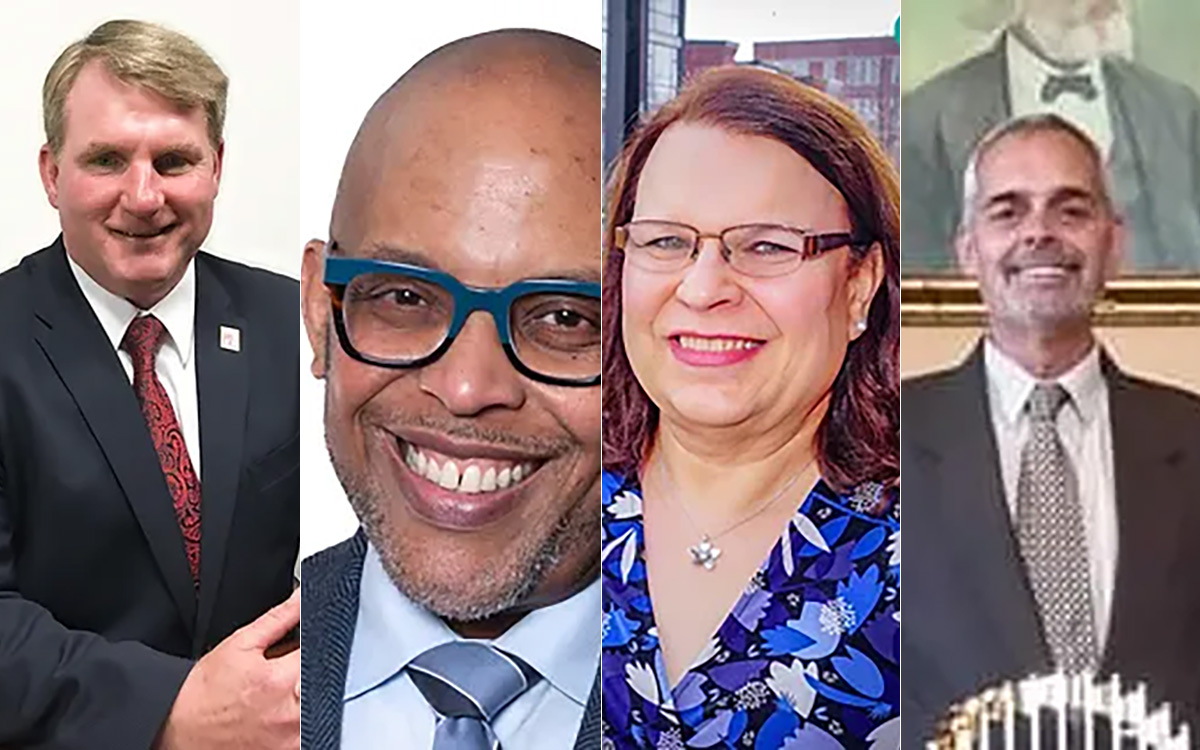
Four LGBTQ Democratic Party activists are running for election as delegates from D.C. to the Democratic National Convention at an April 20 local Democratic Party caucus election in which all D.C. voters who are registered as Democrats will be eligible to vote.
The four LGBTQ candidates are among 32 candidates competing for just 13 elected delegate positions. D.C. will have a total of 51 delegates to the Democratic Convention, but the other 38 include elected officials and party leaders who are considered “automatic” or appointed delegates. The convention will be held in Chicago Aug. 19-23,
Under the delegate selection process put in place by the D.C. Democratic Party, six of the thirteen elected delegate positions will be elected by voters in a section of the city designated as District 1, which includes Wards 1,2, 6, and 8. The other seven elected delegates will be chosen by voters in District 2, which includes Wards 3, 4, 5, and 7.
The LGBTQ candidates include longtime gay Democratic activists David Meadows of Ward 6 and John Fanning of Ward 2 who are running in District 1. Transgender rights advocate and Democratic Party activist Monika Nemeth of Ward 3 and gay Democratic activist Jimmie Williams of Ward 7 are running in District 2.
All four of the LGBTQ candidates have been active members of the Capital Stonewall Democrats, one of D.C.’s largest LGBTQ political organizations. Nemeth and Meadows are past presidents of the organization. Williams has served as chair of the Ward 7 Democratic Committee and is a current member of the committee. Fanning has served as an elected member of the D.C. Democratic State Committee from Ward 2 and served as a delegate to the 2016 Democratic National Convention.
A total of 12 candidates are running in each of the two districts. Under party rules the highest six vote getters in District 1 and the highest 7 vote getters in District 2 will be declared the winners.
The Saturday, April 20 caucus election for the delegate candidates will take place at the Walter E. Washington D.C. Convention Center. An announcement by party officials says two voting sessions will take place, one from 10:00 a.m. to 2:00 p.m. and the other from 4:00 p.m. to 8:00 p.m.
Aside from the elected delegates, two prominent D.C. LGBTQ Democratic leaders will be appointed as delegates to the 2024 Democratic National Convention in their role as members of the Democratic National Committee from D.C.
They are Claire Lucas, a highly acclaimed Democratic Party and LGBTQ rights advocate and party fundraiser; and Earl Fowlkes, one of the lead organizers of D.C.’s annual Black LGBTQ Pride celebration and former president of Capital Stonewall Democrats.
Lucas and Fowlkes and the four LGBTQ candidates running in the April 20 caucus election are committed to backing President Joe Biden as the Democratic nominee for re-election.
Statements from each of the candidates running for delegate in the April 20 caucus election, including the four LGBTQ candidates, can be accessed here: Candidates for Delegate | DC Democratic Party
District of Columbia
HIPS D.C. launches ‘Harm Reduction’ vending machine program
LGBTQ supportive group says program aimed at ‘saving lives’ in response to overdose crisis
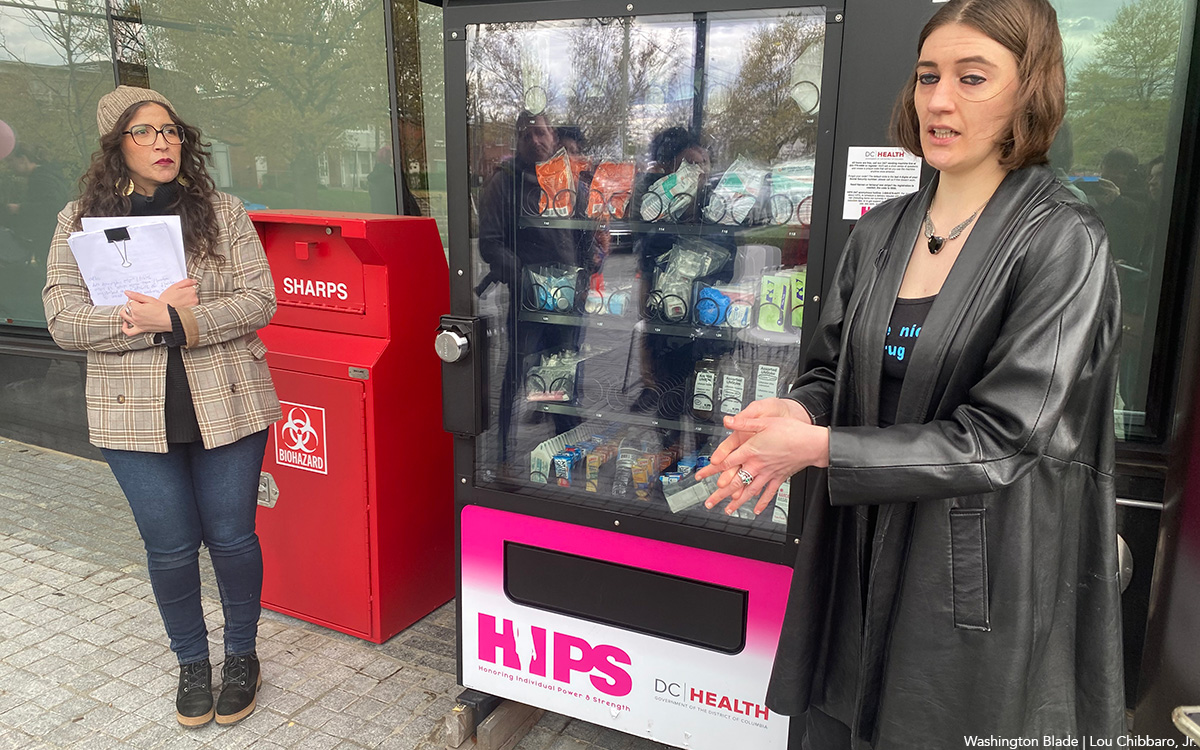
HIPS D.C., the LGBTQ supportive organization that provides support and services for drug users and sex workers, officially launched on April 5 a ‘Harm Reduction Vending Machine Pilot Program’ that it says will help save lives by providing free of charge harm reduction supplies for drug users in locations where there is a “higher than average” rate of overdose cases.
The announcement of the project was held outside the Whitman-Walker Health Max Robinson Center building at 1201 Sycamore Dr., S.E., next to where one of the first three HIPS vending machines is located.
Alexandra Bradley, HIPS’ Outreach and Community Engagement Manager, told a small gathering at the announcement event that among the supplies provided free of charge through the vending machines are naloxone, the life-saving nasal spray medication used to treat an opioid drug overdose; fentanyl test kits, syringes, and syringe wound care kits; drug snort kits, condoms, and other items, including water bottles and snack food such as crackers and granola bars.
Bradley and other officials with HIPS and Whitman-Walker Health said they believe most people, when informed of the rationale behind the vending machines and other programs supporting drug users, will understand that the programs are not encouraging drug use.
“People will use drugs,” Bradley said. “We want them to use them safely,” she added, with the hope that they will seek support to get off drugs. “We can’t help anybody if they are dead. We want to keep people safe,” Bradley said.
A statement released by HIPS says the vending machine pilot program is being funded by a grant from the D.C. Department of Health. It says anyone can access the machines free of charge by contacting HIPS through a phone number posted on the machines – 202-779-0486 – to obtain a four-digit participant code “that they will then punch in to use the machines.” It says that as of April 5, 150 individuals had already registered and enrolled in the program.
Bradley pointed out that registration is not required to obtain naloxone supplies, which can be obtained through a code number posted on the machines. She said each of the three machines are also accompanied by a metal disposal receptacle for safely placing used syringes.
“These machines have been placed in areas where there are higher concentrations of overdose deaths and/or underserved areas with high levels of need for access to services and supplies,” the HIPS statement says.
In addition to the HIPS vending machine at the site of Whitman-Walker’s Max Robinson Center, the second HIPS vending machine is located at The Michelle Obama Southeast Center of Bread for the City at 1700 Marion Barry Avenue, S.E., and the third one is located at Bread for the City’s Shaw neighborhood facility at 1525 7th Street, N.W.
The announcement of the vending machine harm reduction project comes at a time when many in the D.C. LGBTQ community have mourned the loss of beloved local LGBTQ members from a drug overdose, including accidental drug overdoses caused by contamination of their preferred drug such as cocaine with fentanyl.
Also speaking at the announcement event was Andrea Lopez, an Associate Professor at the University of Maryland’s Department of Anthropology, which she said is partnering with HIPS to conduct a study of the vending machine pilot program and its impact as a public health project and the public health benefits of vending machines as an “intervention” in support of those in need.
Others who spoke at the event and provided details of the vending machine project were Cyndee Clay, the HIPS Executive Director; Starr O’Leary, the HIPS Community Outreach Coordinator; and Jona Tanguay, an official with Whitman-Walker Health.
-

 LGBTQ Non-Profit Organizations5 days ago
LGBTQ Non-Profit Organizations5 days agoDay of [no] silence, a call to speak out against anti-LGBTQ+ hate
-

 Africa1 day ago
Africa1 day agoCongolese lawmaker introduces anti-homosexuality bill
-

 Colorado4 days ago
Colorado4 days agoFive transgender, nonbinary ICE detainees allege mistreatment at Colo. detention center
-

 Politics4 days ago
Politics4 days agoFirst lady warns Trump is ‘dangerous to the LGBTQ community’ at HRC event

